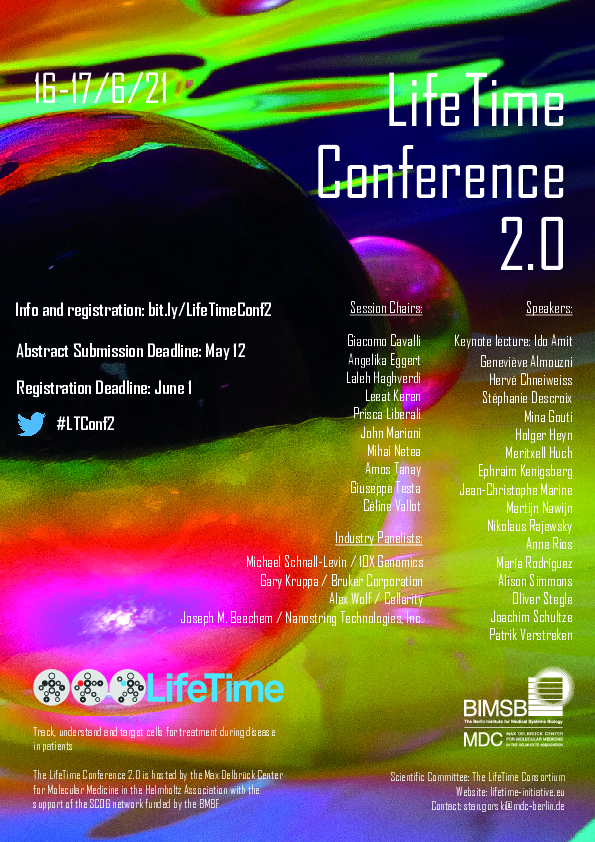Single cells, RNA and the future of medicine
The 2nd LifeTime Conference is teaming up with the annual Berlin Summer Meeting for an exciting week of virtual events hosted by the Berlin Institute for Medical Systems Biology (BIMSB) of the Max Delbrück Center for Molecular Medicine in the Helmholtz Association (MDC) June 16-18, 2021.
The LifeTime Conference 2.0 on June 16 and 17 will feature leading researchers working on single-cell multi-omics and imaging, artificial intelligence and machine learning, and patient-derived experimental disease models, which aim to improve “cell-based medicine” that can intercept disease at the very earliest stages or even before it begins. On June 18, the 14th Berlin Summer Meeting will highlight scientists developing innovative RNA tools that are transforming medicine as we speak.
“These complementary events will bring together some of the world’s pioneers on major areas of research and development that are rapidly changing how we study and treat disease,” says Professor Nikolaus Rajewsky, scientific director of MDC’s Berlin Institute for Medical Systems Biology (BIMSB). “We are excited to have academics, industry, policymakers, investors and patients advocates exchange ideas and help accelerate solutions for patients.”
Tracing disease origins cell by cell
The LifeTime Initiative, which MDC and Institut Curie, Paris helped launch in 2019, aims to understand the very earliest mechanisms that divert cells off their healthy paths and instead contribute to disease. Catching and correcting these changes years, or even decades, before a tumor begins to grow or neurons degenerate, could enable entirely new ways of treating a wide range of diseases. The LifeTime Conference 2.0 will explore the latest progress to study health and disease on the single cell level, which offers incredible detail in both space and time.
Professor Ido Amit, a molecular biologist at the Weizmann Institute of Science in Israel will give the keynote lecture on June 16 titled “The power of ONE: Immunology in the age of single cell genomics.” Amit is well-known for developing single-cell genomic technologies and using them to answer fundamental questions about the immune system. He and his collaborators are also exploring how to engineer genetic sequences to help treat disease.
Other speakers from the US and Europe, including partners from the Single Cell Omics Germany (SCOG) network and LifeTime Consortium, will present around five key themes. “Along with convening recognized experts from around the world, we are also pleased to offer postdoc and Ph.D. students the chance to give short talks so they can get feedback on their projects,” says Marco Uhrig, a science project manager at BIMSB. “Another unique feature will be a panel discussion with industry chief executives working on single cell technologies.”
RNA to the rescue
The long-running Berlin Summer Meeting is known for bringing together computational and experimental research in biology. This year’s meeting “Innovative RNA: from basic discoveries to future medicine” features one of the hottest topics of the year, thanks to the RNA-based COVID-19 vaccines.
Of course, the COVID-19 vaccine is just one way RNA is poised to fundamentally change medicine. Leading researchers from the US and Europe will briefly share their latest efforts to develop RNA-based drugs against cancers and neurodegenerative disease, as well as nanodevices and RNA editing. Among the distinguished speakers is Harvard University Professor David Liu, whose lab successfully engineered base editors to change single base pairs in DNA. Such tools, which build on the CRISPR-Cas9 technology, are being explored to help treat genetic diseases, many of which are caused by single point mutations, such as sickle cell anemia.
Scientists working in industry will share their perspectives as well, including Dr. Jennifer Petter, the founder and chief scientific officer of Arrakis Therapeutics, which is building a pipeline of RNA-targeted small-molecule (rSM) medicines to treat a range of diseases, including cancers and cardiovascular disease. The idea is to modulate RNA before it is translated into DNA and proteins, opening a new frontier of “upstream” interventions.
“While researchers have been exploring the potential of RNA for vaccine applications for more than 30 years, the approval of RNA-based COVID-19 vaccines has really thrown open the door as a proof of concept and paved the way for development of RNA vaccines against cancer and neurodegenerative diseases,” says Rajewsky, a member of the BSM scientific committee.
The scientific committee also includes Professor Emmanuelle Charpentier, director of the Max Planck Unit for the Science of Pathogens and a 2020 Nobel Laureate in Chemistry, Professor Markus Landthaler, head of MDC’s RNA Biology and Posttranscriptional Regulation Lab, and Professor Jörg Vogel, founding director of the Helmholtz Institute for RNA-based Infection Research.
For complete details and registration:
Lifetime website
Berlin Summer Meeting website
Please note each event has its own registration. Both events are free to attend.
Text: Laura Petersen
Further information
Contact
Jutta Kramm
Head of Communications
Max Delbrück Center for Molecular Medicine in the Helmholtz Association (MDC)
+49-30-9406-2140
jutta.kramm@mdc-berlin.de or presse@mdc-berlin.de
- Max Delbrück Center for Molecular Medicine in the Helmholtz Association (MDC)
-
The Max Delbrück Center for Molecular Medicine in the Helmholtz Association (MDC) is one of the world’s leading biomedical research institutions. Max Delbrück, a Berlin native, was a Nobel laureate and one of the founders of molecular biology. At the MDC’s locations in Berlin-Buch and Mitte, researchers from some 60 countries analyze the human system – investigating the biological foundations of life from its most elementary building blocks to systems-wide mechanisms. By understanding what regulates or disrupts the dynamic equilibrium in a cell, an organ, or the entire body, we can prevent diseases, diagnose them earlier, and stop their progression with tailored therapies. Patients should benefit as soon as possible from basic research discoveries. The MDC therefore supports spin-off creation and participates in collaborative networks. It works in close partnership with Charité – Universitätsmedizin Berlin in the jointly run Experimental and Clinical Research Center (ECRC), the Berlin Institute of Health (BIH) at Charité, and the German Center for Cardiovascular Research (DZHK). Founded in 1992, the MDC today employs 1,600 people and is funded 90 percent by the German federal government and 10 percent by the State of Berlin.









